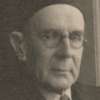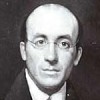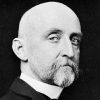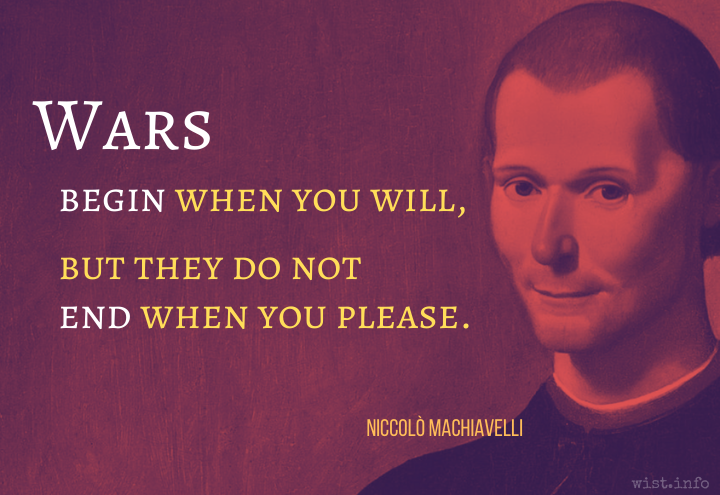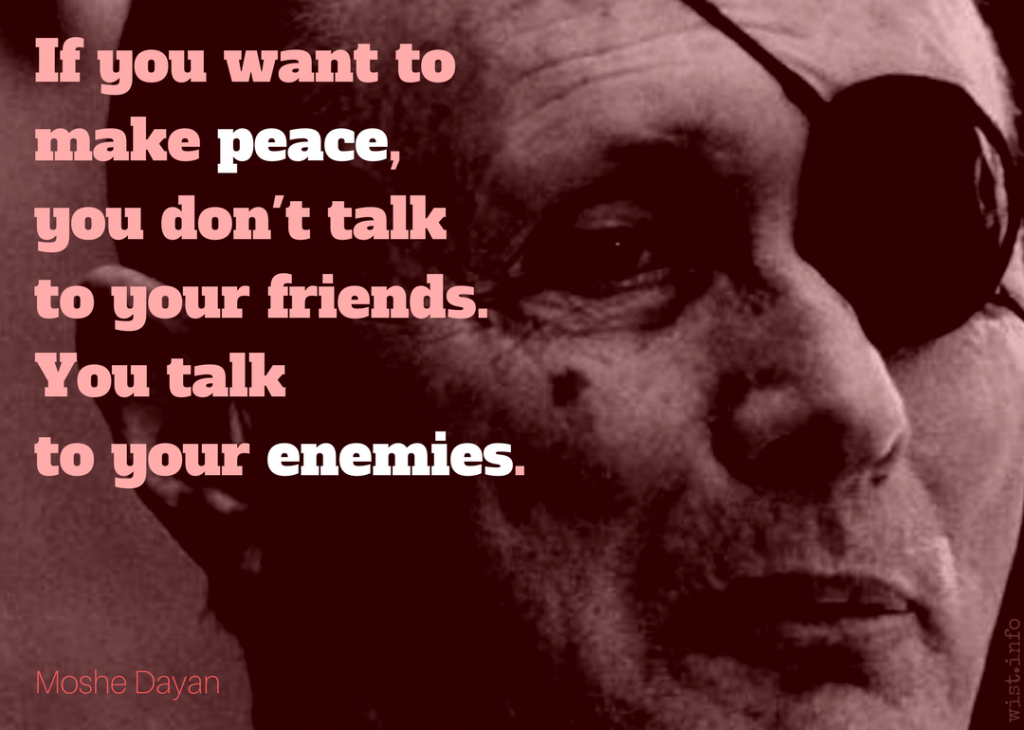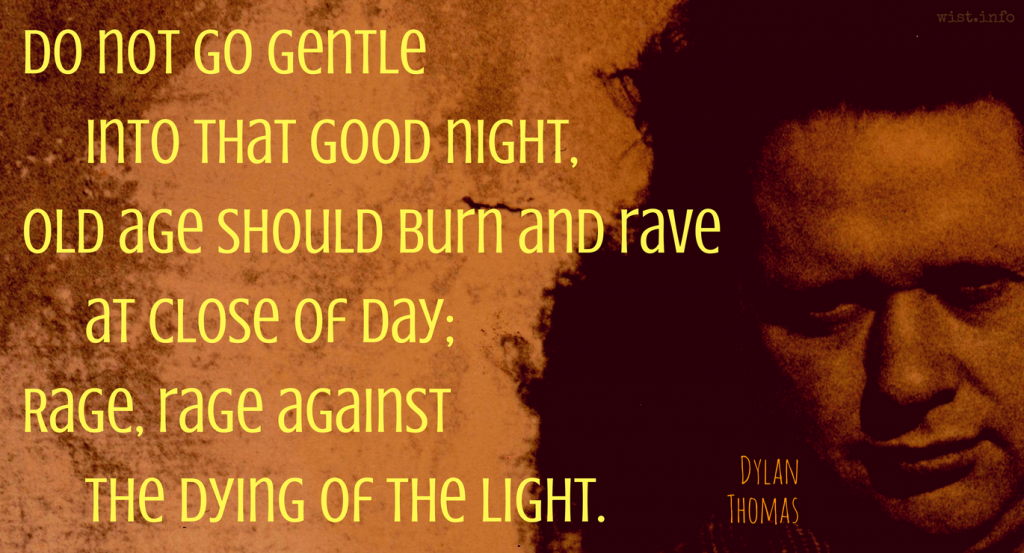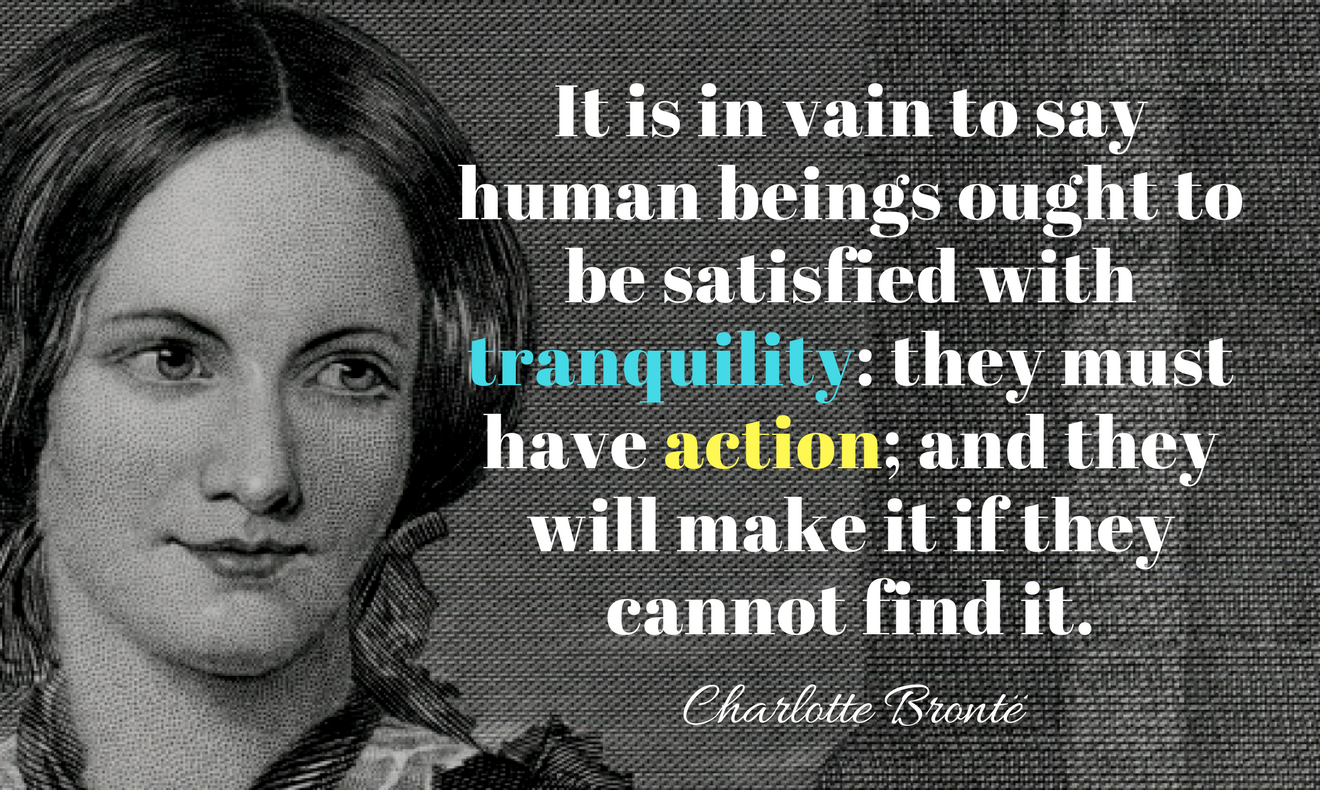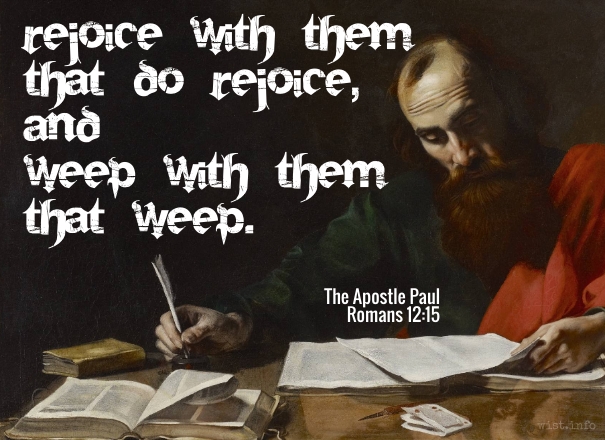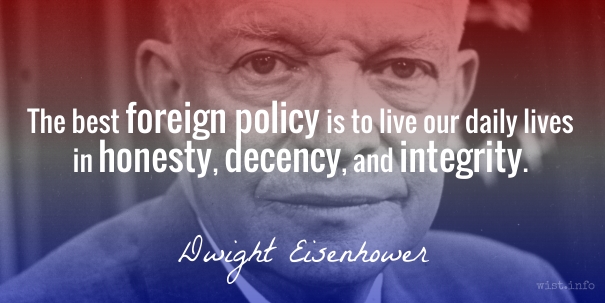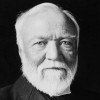The task of war is to destroy life; the task of peace is to create it; to organize labor so that it shall not incapacitate men for leisure; to establish justice as a foundation for personality; to unfold in men the capacity for noble joy and profound sorrow; to liberate them for the passion of love, the perception of beauty, the contemplation of truth. Of all these things war is the enemy.
G. Lowes Dickinson (1862-1932) British political scientist and philosopher [Goldsworthy "Goldie" Lowes Dickinson]
“The War and the Way Out: A Further Consideration,” sec. 3, Atlantic Monthly (1915-04)
(Source)
Quotations about:
peace
Note not all quotations have been tagged, so Search may find additional quotes on this topic.
A war which is destroying men as they have never been destroyed before, from which at the best the nations will emerge permanently degraded in their stock, poorer in physique, duller in intelligence, weaker in will than they went in, this war is to be protracted until the whole manhood of Europe is decimated, in order — in order to what? Let us ask in detail.
In order, we are told, that the Germans may ‘feel they are beaten.’ And then? They will be good in future? They will admit they were wrong? They will lick the hand that chastised them? Who believes it? The more completely they are beaten, the more obstinately they will be set on recovery. When France was beaten to the dust in 1870, did she repent for having provoked the war? On the contrary, she gathered up her forces for revenge. And Germany will do the same.G. Lowes Dickinson (1862-1932) British political scientist and philosopher [Goldsworthy "Goldie" Lowes Dickinson]
“The War and the Way Out: A Further Consideration,” sec. 2, Atlantic Monthly (Apr 1915)
(Source)
Be at peace yourself. Then you will be able to bring peace to others.
[Pone te primus in pace, et tunc alios poteris pacificare.]
Thomas à Kempis (c. 1380-1471) German-Dutch priest, author
The Imitation of Christ [De Imitatione Christi], Book 2, ch. 3, v. 1 (2.3.1) (c. 1418-27) [tr. Rooney (1979)]
(Source)
(Source (Latin)). Alternate translations:
First put thyself in peace, and then mayest thou the better pacify others.
[tr. Whitford/Raynal (1530/1871)]
First put yourself at peace, and then you may the better make others be at peace.
[tr. Whitford/Gardiner (1530/1955)]
Be first of all at peace with thy selfe, then maist thou be better able to pacifie others.
[tr. Page (1639)]
Secure Peace at Home in the first place; and, when thy own Breast is thus composed, it will then be proper to Reconcile and make Peace among thy Neighbors.
[tr. Stanhope (1696; 1706 ed.)]
Thou must first secure the peace of thy own breast; before thou wilt be qualified to restore peace to others.
[tr. Payne (1803)]
First, keep thyself in peace, and then shalt thou be able to pacify others.
[ed. Parker (1841)]
Thou must first secure the peace of thy own breast ere thou be qualified to restore peace to others.
[tr. Dibdin (1851)]
First keep thyself in peace, and then thou wilt be able to bring others to peace.
[ed. Bagster (1860)]
First keep thyself in peace, and then shalt thou be able to be a peacemaker towards others.
[tr. Benham (1874)]
First keep thyself in peace, and then thou shalt be able to keep peace among others.
[tr. Anon. (1901)]
First keep peace with yourself; then you will be able to bring peace to others.
[tr. Croft/Bolton (1940)]
Keep yourself at peace first, and then you will be able to make others peaceful.
[tr. Daplyn (1952)]
Firstly, be peaceful yourself, and you will be able to bring peace to others.
[tr. Sherley-Price (1952)]
Peace in your own soul first of all, then you can think about making peace between other people.
[tr. Knox-Oakley (1959)]
Live in peace yourself and then you can bring peace to others.
[tr. Knott (1962)]
Keep yourself at peace first, and then you will be able to bring peace to others.
[tr. Creasy (1989)]
Peace is like a beautiful woman — it’s wonderful, but has been known to bear watching.
There ain’t nobody on earth, I don’t care how smart they are, ever going to make me believe they will ever stop wars.
I think the best insurance in the world against another war is to take care of the boys who fought in the last one. YOU MAY WANT TO USE THEM AGAIN.
Mark! where his carnage and his conquests cease!
He makes a solitude, and calls it — peace!George Gordon, Lord Byron (1788-1824) English poet
“The Bride of Abydos,” canto 2, st. 20 (1813)
(Source)
Adaptation from Tacitus' Agricola.
Violent means are unlikely to reach a peaceful end … the ends and means are a seamless web.
Gloria Steinem (b. 1934) American feminist, journalist, activist
Moving Beyond Words, Part 6 “Doing Sixty” (1994)
(Source)
Regarding the Vietnam anti-war movement.
The aggressor is always peace-loving (as Bonaparte always claimed to be); he would prefer to take over our country unopposed. To prevent his doing so one must be willing to make war and be prepared for it. In other words it is the weak, those likely to need defense, who should always be armed in order not to be overwhelmed. Thus decrees the art of war.
[Der Eroberer ist immer friedliebend (wie Bonaparte auch stets behauptet hat), er zöge ganz gern ruhig in unseren Staat ein; damit er dies aber nicht könne, darum müssen wir den Krieg wollen und also auch vorbereiten, d. h. mit anderen Worten: es sollen gerade die Schwachen, der Verteidigung Unterworfenen, immer gerüstet sein und nicht überfallen werden; so will es die Kriegskunst.]
Karl von Clausewitz (1780-1831) Prussian soldier, historian, military theorist
On War [Vom Kriege], Book 6, ch. 5 “Character of Strategic Defense [Charakter der strategischen Verteidigung],” (6.5) (1832) [tr. Howard & Paret (1976)]
(Source)
(Source (German)). Alternate translation:
A conqueror is always a lover of peace (as Buonaparte always asserted of himself); he would like to make his entry into our state unopposed; in order to prevent this, we must choose war, and therefore also make preparations, that is in other words, it is just the weak, or that side which must defend itself, which should be always armed in order not to be taken by surprise; so it is willed by the art of war.
[tr. Graham (1873)]
But you, Roman, remember, rule with all your power
the peoples of the earth — these will be your arts:
to put your stamp on the works and ways of peace,
to spare the defeated, break the proud in war.[Tu regere imperio populos, Romane, memento
(Hae tibi erunt artes), pacique imponere morem,
Parcere subjectis et debellare superbos.]Virgil (70-19 BC) Roman poet [b. Publius Vergilius Maro; also Vergil]
The Aeneid [Ænē̆is], Book 6, l. 851ff (6.851-53) [Anchises] (29-19 BC) [tr. Fagles (2006), l. 981ff]
(Source)
Comparing the Roman "arts" to the arts at which other nations excel (metalwork, sculpture, oratory, astronomy).
(Source (Latin)). Alternate translations:
Be thou ambitious how to govern best,
In these arts, Roman, thou must be profest.
That we a peace well grounded may injoy,
Subjects to spare, and Rebels to destroy.
[tr. Ogilby (1649)]
But, Rome, 'tis thine alone, with awful sway,
To rule mankind, and make the world obey,
Disposing peace and war by thy own majestic way;
To tame the proud, the fetter'd slave to free:
These are imperial arts, and worthy thee.
[tr. Dryden (1697)]
To rule the nations with imperial sway be thy care, O Romans: these shall be thy arts; to impose terms of peace, to spare the humbled, and crush the proud.
[tr. Davidson/Buckley (1854)]
But ye, my Romans, still control
The nations far and wide:
Be this your genius -- to impose
The rule of peace on vanquished foes,
Show pity to the humbled soul,
And crush the sons of pride
[tr. Conington (1866)]
But thou, O Roman, bend thy mind to rule
With strength thy people. This shall be thy art;
And to impose the terms and rules of peace;
To spare the vanquished, and subdue the proud.
[tr. Cranch (1872), l. 1069ff]
Be thy charge, O Roman, to rule the nations in thine empire; this shall be thine art, to lay down the law of peace, to be merciful to the conquered and beat the haughty down.
[tr. Mackail (1885)]
But thou, O Roman, look to it the folks of earth to sway;
For this shall be thine handicraft, peace on the world to lay,
To spare the weak, to wear the proud by constant weight of war.
[tr. Morris (1900), l. 850ff]
Thou, Roman, rule, and o'er the world proclaim
The ways of peace. Be these thy victories,
To spare the vanquished and the proud to tame.
These are imperial arts, and worthy of thy name.
[tr. Taylor (1907), st. 114, l. 1023ff.]
But thou, O Roman, learn with sovereign sway
To rule the nations. Thy great art shall be
To keep the world in lasting peace, to spare
humbled foe, and crush to earth the proud.
[tr. Williams (1910)]
Remember thou, O Roman, to rule the nations with thy sway -- these shall be thine arts -- to crown Peace with Law, to spare the humbled, and to tame in war the proud!
[tr. Fairclough (1916)]
Remember, Roman,
To rule the people under law, to establish
The way of peace, to battle down the haughty,
To spare the meek. Our fine arts, these, forever.
[tr. Humphries (1951)]
But, Romans, never forget that government is your medium!
Be this your art: -- to practise men in the habit of peace,
Generosity to the conquered, and firmness against aggressors.
[tr. Day-Lewis (1952)]
But yours will be the rulership of nations,
remember, Roman, these will be your arts:
to teach the ways of peace to those you conquer,
to spare defeated peoples, tame the proud.
[tr. Mandelbaum (1971), l. 1134ff]
Roman, remember by your strength to rule
Earth's peoples -- for your arts are to be these:
To pacify, to impose the rule of law,
To spare the conquered, battle down the proud.
[tr. Fitzgerald (1981), l. 1151ff]
Your task, Roman, and do not forget it, will be to govern the peoples of the world in your empire. These will be your arts -- and to impose a settle pattern upon peace, to pardon the defeated and war down the proud.
[tr. West (1990)]
Remember, Roman, it is for you to rule the nations with your power,
(that will be your skill) to crown peace with law,
to spare the conquered, and subdue the proud.
[tr. Kline (2002)]
Your mission, Roman, is to rule the world.
These will be your arts: to establish peace,
To spare the humbled, and to conquer the proud.
[tr. Lombardo (2005), l. 1012ff]
Roman, remember that your arts are to rule
The nations with your empire, to enforce the custom of peace,
To spare the conquered and to subjugate the proud.
[tr. @sentantiq (2018)]
You, Roman, remember your own arts: to rule the world with law, impose your ways on peace, grant the conquered clemency, and crush the proud in war.
[tr. Bartsch (2021)]
See also Bob Dylan, "Lonesome Day Blues", Love and Theft (2001):
I'm gonna spare the defeated --
I'm gonna speak to the crowd.
I'm gonna spare the defeated, boys,
I'm going to speak to the crowd.
I am goin' to teach peace to the conquered,
I'm gonna tame the proud.
FIRST SERVINGMAN: Let me have war, say I. It exceeds peace as far as day does night. It’s sprightly walking, audible, and full of vent. Peace is a very apoplexy, lethargy; mulled, deaf, sleepy, insensible; a getter of more bastard children than war’s a destroyer of men.
William Shakespeare (1564-1616) English dramatist and poet
Coriolanus, Act 4, sc. 5, l. 244ff (4.5.244-249) (c. 1608)
(Source)
He who without necessity embarks
In many matters, is a fool for slighting
The obvious blessings of a tranquil life.[ὅστις δὲ πράσσει πολλὰ µὴ πράσσειν παρόν,
µῶρος, παρὸν ζῆν ἡδέως ἀπράγµονα.]Euripides (485?-406? BC) Greek tragic dramatist
Antiope [Αντιοπη], frag. 193 (TGF, Kannicht) [Amphion] (c. 410 BC) [tr. Wodhall (1809)]
(Source)
Barnes fragment 104, Musgrave 25. (Source (Greek)). Alternate translation:
Whoever is very active when he may be inactive, is a moron,
when he may live pleasantly keeping clear from politics.
[tr. Will (2015)]
Whoever is overactive when he could relax
is foolish, for he misses out on a pleasant life.
[Source]
If you want Peace, work for Justice.
Paul VI (1897-1978) Italian Catholic Pope (1963-1978) [born Giovanni Battista Enrico Antonio Maria Montini]
Message for the Day of Peace (8 Dec 1971)
(Source)
Message for the 5th World Day of Peace (1 Jan 1972), written on the above date.
War should be made with no other view than the attainment of peace.
[Bellum autem ita suscipiatur, ut nihil aliud nisi pax quaesita videatur.]
Marcus Tullius Cicero (106-43 BC) Roman orator, statesman, philosopher
De Officiis [On Duties; On Moral Duty; The Offices], Book 1, ch. 23 (1.23) / sec. 80 (44 BC) [tr. McCartney (1798)]
(Source)
(Source (Latin)). Alternate translations:
And as for war, it should never be undertaken with any other aim, but only that of obtaining an honourable peace.
[tr. Cockman (1699)]
Now in engaging in war we ought to make it appear that we have no other view but peace.
[tr. Edmonds (1865)]
But war should be undertaken in such a way that it may seem nothing else than a quest of peace.
[tr. Peabody (1883)]
We should only take up arms when it is evident that peace is the one object we pursue.
[tr. Gardiner (1899)]
We should so enter upon war as to show that our only desire is peace.
[ed. Harbottle (1906)]
War, however, should be undertaken in such a way as to make it evident that it has no other object than to secure peace.
[tr. Miller (1913)]
You should start a war, moreover, in such a way that you clearly have no other object than peace.
[tr. Edinger (1974)]
Happiness is thought to imply leisure; for we toil in order that we may have leisure, as we make war in order that we may enjoy peace.
[δοκεῖ τε ἡ εὐδαιμονία ἐν τῇ σχολῇ εἶναι, ἀσχολούμεθα γὰρ ἵνα σχολάζωμεν καὶ πολεμοῦμεν ἵν᾽ εἰρήνην ἄγωμεν.]
Aristotle (384-322 BC) Greek philosopher
Nicomachean Ethics [Ἠθικὰ Νικομάχεια], Book 10, ch. 7 (10.7) / 1177b.4 (c. 325 BC) [tr. Peters (1893), 10.7.6]
(Source)
(Source (Greek)). Alternate translations:
Happiness is thought to stand in perfect rest; for we toil that we may rest, and war that we may be at peace.
[tr. Chase (1847), ch. 6]
It would seem that happiness is the very antithesis of a busy life, in that it is compatible with perfect leisures. And it is with such leisure in view that a busy life is always led, exactly as war is only waged for the sake of ultimate peace.
[tr. Williams (1869)]
The end of labor is to gain leisure.
[in Ballou, Treasury of Thought (1872)]
Happiness is thought to depend on leisure; for we are busy that we may have leisure, and make war that we may live in peace.
[tr. Ross (1908)]
Happiness is thought to involve leisure; for we do business in order that we may have leisure, and carry on war in order that we may have peace.
[tr. Rackham (1934)]
Happiness seems to reside in leisure, since we do unleisured things in order to be at leisure, and wage war in order to live in peace.
[tr. Reeve (1948)]
Happiness is thought to depend on leisure; for we toil for the sake of leisurely activity, and we are at war for the sake of peaceful activity.
[tr. Apostle (1975)]
Happiness seems to depend on leisure, because we work to have leisure, and wage war to live in peace.
[tr. Crisp (2000)]
[Because], happiness seems to reside in leisure, we labor [sacrifice leisure] so that we may have leisure.
[tr. @sentantiq (2018)]
I have no idea what your generation will be like. In mine we were to enjoy “Peace in our time.” A very well meaning gentleman waved his umbrella and shouted those very words … less than a year before the whole world went to war. But this gentleman was suffering the worldly disease of insufferable optimism. He and his fellow humans kept polishing the rose colored glasses when actually they should have taken them off. They were sacrificing reason and reality for a brief and temporal peace of mind, the same peace of mind that many of my contemporaries derive by steadfastly refraining from remembering the War that came before. All this was in my time, youngster — I hope not in yours.
Rod Serling (1924-1975) American screenwriter, playwright, television producer, narrator
“First Squad, First Platoon,” Dedication (c. 1947)
(Source)
Dedication to his unborn children, in one of his first (unpublished) works of fiction, while at Antioch College under the GI Bill. In Anne Serling, As I Knew Him: My Dad, Rod Serling (2013).
Our country is the world, our countrymen are all mankind. We love the land of our nativity, only as we love all other lands. The interests, rights, and liberties of American citizens are no more dear to us than are those of the whole human race. Hence we can allow no appeal to patriotism, to revenge any national insult or injury.
William Lloyd Garrison (1805-1879) American abolitionist, journalist, suffragist, social reformer
Declaration of Sentiments, Boston Peace Conference ( 28 Sep 1838)
(Source)
You’ll never have a quiet world till you knock the patriotism out of the human race.
These are times in which a Genious would wish to live. It is not in the still calm of life, or the repose of a pacific station, that great characters are formed. Would Cicero have shone so distinguished an orater, if he had not been roused, kindled and enflamed by the Tyranny of Catiline, Millo, Verres and Mark Anthony. The Habits of a vigorous mind are formed in contending with difficulties. All History will convince you of this, and that wisdom and penetration are the fruits of experience, not the Lessons of retirement and leisure. Great necessities call out great virtues. When a mind is raised, and animated by scenes that engage the Heart, then those qualities which would otherways lay dormant, wake into Life, and form the Character of the Hero and the Statesman.
Abigail Adams (1744-1818) American correspondent, First Lady (1797-1801)
Letter to John Quincy Adams (19 Jan 1780)
(Source)
Written when John Quincy was twelve, in Paris with his father for the peace negotiations with Britain.
Silence is a great peacemaker.
If we stay strong, then I believe we can stabilize the world and have peace based on force. Now, peace based on force is not as good as peace based on agreement, but in the terrible world in which we live, in the world where the Russians have enslaved many millions of human beings, in the world where they have killed men, I think that for the time being the only peace we can have is the peace based on force.
Edward Teller (1908-2003) Hungarian-American theoretical physicist
“Fallout and Disarmament: A Debate Between Linus Pauling and Edward Teller,” KQED-TV, San Francisco (20 Feb 1958)
(Source)
War may sometimes be a necessary evil. But no matter how necessary, it is always an evil, never a good. We will not learn how to live together in peace by killing each other’s children.
Jimmy Carter (b. 1924) American politician, US President (1977-1981), Nobel laureate [James Earl Carter, Jr.]
Nobel Peace Prize Lecture (10 Dec 2002)
(Source)
Man’s greatest blunder has been in trying to make peace with the skies instead of making peace with his neighbors.
Elbert Hubbard (1856-1915) American writer, businessman, philosopher
In The Philistine (Sep 1910)
(Source)
Reprinted in The Philosophy of Elbert Hubbard, "Epigrams" (1916) [ed. Hoyle].
As far as the advocacy of peace rests on material motives like economy and prosperity, it is the service of Mammon; and the bottom of the platform will drop out when Mammon thinks that war will pay better.
A. T. Mahan (1840-1914) American admiral, strategist, historian [Alfred Thayer Mahan]
(Attributed)
(Source)
Attributed in William Ralph Inge, "The Indictment against Christianity" (1917), Outspoken Essays, ch. 10 (1919).
We have no small hope in our elections, but it is still uncertain. There is some suspicion of a dictatorship. We have peace in public but it is the calm of an old and tired state, not one giving consent.
[Erat non nulla spes comitiorum sed incerta, erat aliqua suspicio dictaturae, ne ea quidem certa, summum otium forense sed senescentis magis civitatis quam acquiescentis]
Marcus Tullius Cicero (106-43 BC) Roman orator, statesman, philosopher
Letters to Quintus #19 (2.15) (Jun, AD 54) [tr. Bailey (1999)]
(Source)
Alt. trans.:
- "There was some expectation of the comitia, but a doubtful one: there was some suspicion of a dictatorship, but not even that was certain. There is a perfect cessation of all business in the courts of law, but more as if the state was growing indolent from age than from real tranquility." [Letter 14, tr. Watson (1855)]
- "There is some hope of elections, but doubtful; some suspicion of a Dictatorship, but that too not definite; peace reigns in the Forum, but it's the peace of a senile community rather than a contented one." [Letter 19 (II.15), tr. @sentantiq (2020)]
The real and lasting victories are those of peace and not of war.
Ralph Waldo Emerson (1803-1882) American essayist, lecturer, poet
“Worship,” The Conduct of Life, ch. 6 (1860)
(Source)
Wars begin when you will, but they do not end when you please.
Niccolò Machiavelli (1469-1527) Italian politician, philosopher, political scientist
Florentine Histories, Book 3, ch. 2 (1521-5)
As commonly given, specific translation unknown. Alt. trans.:
- "It is in the power of any man to begin a war, but he cannot end it when he pleases." [tr. Lester (1843)]
- "People may go to war when they will, but cannot always withdraw when they like." [Bohn's Standard Library (1891)]
- "Wars begin at the will of anyone, but they do not end at anyone's will." [tr. Banield and Mansfield (1988), Book 3, ch. 7]
What man actually needs is not a tensionless state but rather the striving and struggling for a worthwhile goal, a freely chosen task.
Viktor Frankl (1905-1997) German-American psychologist, writer
Man’s Search for Meaning, Part 2 (1946)
(Source)
I realize that all society rests upon force. But all the great creative actions, all the decent human relations, occur during the intervals when force has not managed to come to the front. These intervals are what matter. I want them to be as frequent and as lengthy as possible, and I call them “civilization”.
E. M. Forster (1879-1970) English novelist, essayist, critic, librettist [Edward Morgan Forster]
“What I Believe,” The Nation (16 Jul 1938)
(Source)
For some reason, the most vocal Christians among us never mention the Beatitudes. But, often with tears in their eyes, they demand that the Ten Commandments be posted in public buildings. And of course, that’s Moses, not Jesus. I haven’t heard one of them demand that the Sermon on the Mount, the Beatitudes, be posted anywhere. “Blessed are the merciful” in a courtroom? “Blessed are the peacemakers” in the Pentagon? Give me a break!
Kurt Vonnegut, Jr. (1922-2007) American novelist, journalist
A Man Without A Country, ch. 9 (2005)
(Source)
The Beatitudes (Matthew 5).
HENRY: Once more unto the breach, dear friends, once more;
Or close the wall up with our English dead!
In peace, there’s nothing so becomes a man,
As modest stillness and humility:
But when the blast of war blows in our ears,
Then imitate the action of the tiger;
Stiffen the sinews, summon up the blood,
Disguise fair nature with hard-favored rage ….William Shakespeare (1564-1616) English dramatist and poet
Henry V, Act 3, sc. 1, l. 1ff (3.1.1-8) (1599)
(Source)
Do not go gentle into that good night,
Old age should burn and rave at close of day;
Rage, rage against the dying of the light.Dylan Thomas (1914-1953) Welsh poet and writer
“Do Not Go Gentle into That Good Night” (1947)
(Source)
First published in Botteghe Oscure (Nov 1951).
It is in vain to say human beings ought to be satisfied with tranquility: they must have action; and they will make it if they cannot find it.
Charlotte Brontë (1816-1855) British novelist [pseud. Currer Bell]
Jane Eyre, ch. 12 [Jane] (1847)
(Source)
There is no such thing as inner peace. There is only nervousness or death.
It had been boldly predicted by some of the early Christians that the conversion of the world would lead to the establishment of perpetual peace. In looking back, with our present experience, we are driven to the melancholy conclusion that, instead of diminishing the number of wars, ecclesiastical influence as actually and very seriously increased it.
I heard the bells on Christmas Day
Their old, familiar carols play,
And wild and sweet
The words repeat
Of peace on earth, good-will to men!
God offers to every mind its choice between truth and repose. Take which you please — you can never have both.
Ralph Waldo Emerson (1803-1882) American essayist, lecturer, poet
“Intellect,” Essays: First Series (1841)
(Source)
The manhood that has been in war must be transferred to the cause of peace, before war can lose its charm, and peace be venerable to men.
Ralph Waldo Emerson (1803-1882) American essayist, lecturer, poet
“War,” lecture, Boston (1838-03), Aesthetic Papers, Article 3 (1849)
(Source)
It is no longer a choice, my friends, between violence and nonviolence. It is either nonviolence or nonexistence. And the alternative to disarmament, the alternative to a greater suspension of nuclear tests, the alternative to strengthening the United Nations and thereby disarming the whole world, may well be a civilization plunged into the abyss of annihilation, and our earthly habitat would be transformed into an inferno that even the mind of Dante could not imagine.
Martin Luther King, Jr. (1929-1968) American clergyman, civil rights leader, social activist, preacher
“Remaining Awake Through a Great Revolution,” National Cathedral, Washington, DC (31 Mar 1968)
(Source)
Rejoice with them that do rejoice, and weep with them that weep.
The Bible (The New Testament) (AD 1st - 2nd C) Christian sacred scripture
Romans 12:15 [KJV]
Quoting 12:15-18: "Rejoice with those who rejoice, and weep with those who weep. Be of the same mind toward one another; do not be haughty in mind, but associate with the lowly Do not be wise in your own estimation. Never pay back evil for evil to anyone Respect what is right in the sight of all men. If possible, so far as it depends on you, be at peace with all men."
The best foreign policy is to live our daily lives in honesty, decency, and integrity; at home, making our own land a more fitting habitation for free men; and abroad, joining with those of like mind and heart, to make of the world a place where all men can dwell in peace.
Dwight David Eisenhower (1890-1969) American general, US President (1953-61)
Inaugural Gabriel Silver lecture, Columbia University (23 Mar 1950)
I have said time and again there is no place on this earth to which I would not travel, there is no chore I would not undertake if I had any faintest hope that, by so doing, I would promote the general cause of world peace.
I like to believe that people, in the long run, are going to do more to promote peace than our governments. Indeed, I think that people want peace so much that one of these days governments had better get out of the way and let them have it.
The peace we seek and need means much more than mere absence of war. It means the acceptance of law, and the fostering of justice, in all the world.
Are there no ideals more stirring than those of martial glory? Is this generation conscious of calls to the service of native land in ways no more worthy than the way of taking a musket and killing somebody? You ask, in the language of Prof. James, for a moral equivalent for war. A patriot needs only look about to find numberless causes that ought to warm the blood and stir the imagination. The dispelling of ignorance and the fostering of education, the investigation of disease and the searching out of remedies that will vanquish the giant ills that decimate the race, the inculcation of good feeling in the industrial world, the cause of the aged, the cause of the men and women who had so little chance — tell me, has war anything that beckons as these things beckon with alluring and compelling power? Whoso wants to share the heroism of battle let him join the fight against ignorance and disease — and the mad idea that war is necessary.
Andrew Carnegie (1835-1919) American industrialist and philanthropist
“A Plea for Peace,” New York Times (7 Apr 1907)
(Source)
In vast stretches of the earth, men awoke today in hunger. They will spend the day in unceasing toil. And as the sun goes down they will still know hunger. They will see suffering in the eyes of their children. Many despair that their labor will ever decently shelter their families or protect them against disease. So long as this is so, peace and freedom will be in danger throughout our world. For wherever free men lose hope of progress, liberty will be weakened and the seeds of conflict will be sown.

